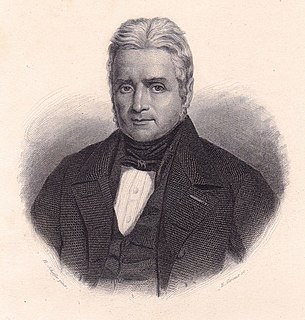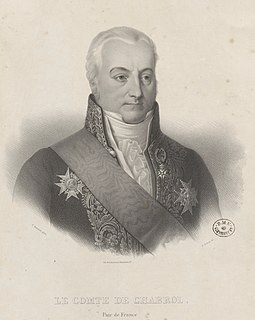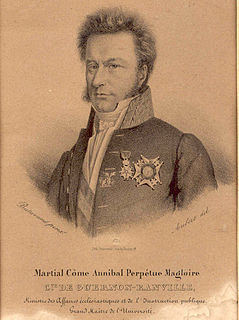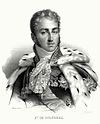
The Bourbon Restoration was the period of French history following the first fall of Napoleon in 1814 and his final defeat in the Hundred Days in 1815, until the July Revolution of 1830. The brothers of the executed Louis XVI, namely Louis XVIII and Charles X, successively mounted the throne and instituted a conservative government aiming to restore the proprieties, if not all the institutions, of the Ancien Régime. Exiled supporters of the monarchy returned to France. They were nonetheless unable to reverse most of the changes made by the French Revolution and Napoleon. Exhausted by decades of war, the nation experienced a period of internal and external peace, stable economic prosperity and the preliminaries of industrialization.

Charles X was King of France from 16 September 1824 until 2 August 1830. An uncle of the uncrowned Louis XVII and younger brother to reigning kings Louis XVI and Louis XVIII, he supported the latter in exile. After the Bourbon Restoration in 1814, Charles became the leader of the ultra-royalists, a radical monarchist faction within the French court that affirmed rule by divine right and opposed the concessions towards liberals and guarantees of civil liberties granted by the Charter of 1814. Charles gained influence within the French court after the assassination of his son Charles Ferdinand, Duke of Berry, in 1820 and eventually succeeded his brother in 1824.

Jean-Baptiste Sylvère Gay, 1st Viscount of Martignac was a moderate royalist French statesman during the Bourbon Restoration 1814–30 under King Charles X.

Jean-Baptiste Guillaume Joseph Marie Anne Séraphin, 1st Count of Villèle, better known simply as Joseph de Villèle, was a French statesman. Several times Prime minister, he was a leader of the Ultra-royalist faction during the Bourbon Restoration.

Jacques Laffitte was a leading French banker, governor of the Bank of France (1814–1820) and liberal member of the Chamber of Deputies during the Bourbon Restoration and July Monarchy. He was an important figure in the development of new banking techniques during the early stages of industrialization in France. In politics, he played a decisive role during the Revolution of 1830 that brought Louis-Philippe, the duc d'Orléans, to the throne, replacing the unpopular Bourbon king Charles X. Laffitte was named president of the new Citizen King's Council of Ministers and Minister of Finances. After a brief ministry of 131 days, his "Party of Movement" gave way before the "Party of Order" led by the banker Casimir-Pierre Perier. Laffitte left office discredited politically and financially ruined. He rebounded financially in 1836 with his creation of the Caisse Générale du Commerce et de l'Industrie, a forerunner of French investment banks of the second half of the 19th century such as the Crédit Mobilier (1852). The Caisse Générale did not survive the financial crisis caused by the Revolution of 1848.

Jean-Guillaume, baron Hyde de Neuville was a French aristocrat, diplomat, and politician.
The Ultra-royalists were a French political faction from 1815 to 1830 under the Bourbon Restoration. An Ultra was usually a member of the nobility of high society who strongly supported Roman Catholicism as the state and only legal religion of France, the Bourbon monarchy, traditional hierarchy between classes and census suffrage against popular will and the interests of the bourgeoisie and their liberal and democratic tendencies.

Rambouillet is a commune in the Yvelines department in the Île-de-France region of France. It is located on the outskirts of Paris, 44.3 km (27.5 mi) southwest from the centre. Rambouillet is a sub-prefecture of the department.
The Anti-Sacrilege Act (1825–1830) was a French law against blasphemy and sacrilege passed in April 1825 under King Charles X. The death penalty provision of the law was never applied, but a man named François Bourquin was sentenced to perpetual forced labour for sacrilegial burglary; the law was later revoked at the beginning of the July Monarchy under King Louis-Philippe.

Louis Charles Auguste Le Tonnelier, Baron de Breteuil, Baron de Preuilly was a French aristocrat, diplomat and statesman. He was the last Prime Minister of the Bourbon Monarchy, appointed by King Louis XVI only one hundred hours before the storming of the Bastille.
The Minister for the Maison du Roi was a cabinet role under the French monarchy, conferring leadership of the Maison du Roi.
Alexandre Pierre Moline de Saint-Yon was a French general, writer, and politician.

Jacques Joseph Guillaume François Pierre, comte de Corbière was a French lawyer who became Minister of the Interior. He was intolerant of liberalism and a strong supporter of the church.

Christophe André Jean de Chabrol de Crouzol was a French politician who served in the administration of Napoleon, then adhered to the Bourbon Restoration in 1814. As Prefect of Rhône he acquiesced in brutal reprisals in 1817 against former supporters of Bonaparte. He was an elected deputy from 1820 to 1822, then was made a peer of France. He served as Minister of the Navy (1824–29) and as Minister of Finance (1829–30). Chabrol resigned before the July Revolution of 1830, unwilling to remain associated with the increasingly repressive government, but remained a supporter of the Bourbon monarchy.

Count Martial Côme Annibal Perpétue Magloire de Guernon-Ranville was a French magistrate and politician. He was Minister of Public Education and Religious Affairs in the Ministry of Jules de Polignac during the last months of the Bourbon Restoration.

François-Régis de La Bourdonnaye, Comte de La Bretèche, was a French national deputy from 1815 to 1830. He sat on the extreme right, and was known for his violent attacks on the governments of the Bourbon Restoration. In 1829 he was briefly Minister of the Interior. In 1830 he was made a peer of France a few months before the July Revolution ended his political career.

Antoine Roy was a French lawyer and politician. He was a National Representative during the Hundred Days when Napoleon returned from Elba, a Deputy from 1815 to 1821, a peer of France and three times Minister of Finance.

Pierre Alpinien Bertrand Bourdeau was a French deputy from 1815 to 1831 and from 1834 to 1836. He was briefly Minister of Justice in 1829, and was made a peer of France during the July Monarchy. He is known for his hostility to the press, and for trying to hold newspaper managers responsible for libels published after they had left the paper.

Dominique-Vincent Ramel was a French lawyer and politician who became Minister of Finance under the French Directory. He was an energetic reformer, but was blamed for many of the financial problems of the time, and went into retirement during the French Consulate and First French Empire. He supported Napoleon during the Hundred Days of 1815. After the second Bourbon Restoration, as a regicide he was forced into exile in Belgium, where he died without returning to France.

Guillaume-Charles Faipoult was a French aristocrat, soldier and politician who was Minister of Finance during the French Revolution. He then represented France in Italy, where he organized the newly formed republics. During the First French Empire he was prefect of the Scheldt department, and then Minister of Finance in Spain under Joseph Bonaparte. Faipoult was prefect of Saône-et-Loire during the Hundred Days.

















